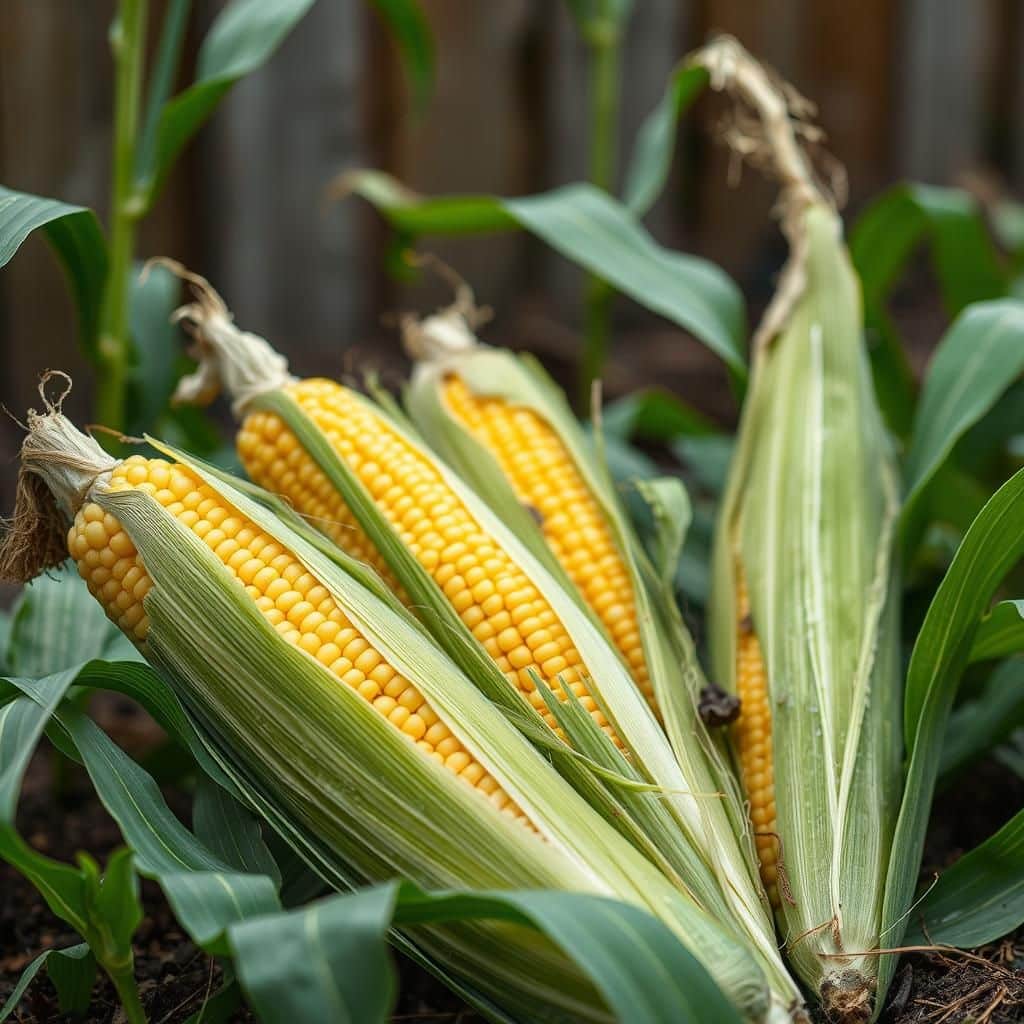Can Corn Cobs Go in Compost? Discover the Best Composting Practices!

Composting is an eco-friendly way to recycle organic waste, but not all materials decompose equally. One common question arises: can corn cobs be added to compost? These sturdy remnants of corn can contribute valuable nutrients to your compost pile if handled correctly. In this article, we will explore the best composting practices for corn cobs, discussing their benefits, how to prepare them for composting, and tips to ensure they break down efficiently. Whether you’re a seasoned composter or a beginner, understanding how to incorporate corn cobs can enhance your composting experience and improve soil health.
Can Corn Cobs Go in Compost?
Yes, corn cobs can go in compost, as they are organic materials that decompose over time. However, it is essential to chop them into smaller pieces to facilitate the composting process. Whole corn cobs take a longer time to break down due to their tough, fibrous texture. When added to your compost pile, they contribute valuable carbon, which balances the nitrogen-rich materials like vegetable scraps. It's advisable to mix them with other compostable materials to ensure a healthy balance of greens and browns, promoting effective decomposition and nutrient enrichment for your garden.
Benefits of Composting Corn Cobs
Composting corn cobs offers multiple benefits for soil health and garden productivity. They are a source of carbon that enriches the compost mix, improving aeration and structure when composted. This increase in porosity aids in water retention and provides a suitable environment for beneficial microorganisms, which are crucial for effective composting. Additionally, as they break down, they release nutrients that help improve soil fertility, making them a fantastic addition to any compost pile.
How to Prepare Corn Cobs for Composting
To prepare corn cobs for composting, first, ensure they are free from any pesticides or chemical residues that may harm the composting process. Next, cut the cobs into smaller, manageable pieces; this increases surface area and accelerates breakdown. If possible, soak the pieces in water for a few hours before adding them to the compost pile, which can help initiate the decomposition process. Once prepared, mix them well with other organic materials to achieve an optimal carbon-to-nitrogen ratio.
Time Required for Corn Cobs to Decompose
The decomposition time for corn cobs varies but generally takes 6 to 12 months when placed in a traditional compost pile. The timeframe can be influenced by factors such as moisture levels, temperature, and the size of the cob pieces. Keeping the compost pile aerated and maintaining adequate moisture levels will speed up the process. Regularly turning the pile and monitoring its conditions will ensure that the corn cobs break down more quickly, contributing to a rich compost product sooner.
See also:
Composting Corn Cobs with Other Materials
When composting corn cobs, it is beneficial to pair them with other organic materials for a balanced compost mix. Combine them with nitrogen-rich items such as grass clippings, vegetable scraps, or coffee grounds to create an ideal carbon-to-nitrogen ratio. This balance is crucial because it promotes microbial activity, which is essential for decomposing tougher materials like corn cobs. Using a variety of compostable materials not only speeds up decomposition but also enriches the final compost product.
Common Mistakes to Avoid When Composting Corn Cobs
When composting corn cobs, avoid common mistakes that can hinder the process. One significant error is adding whole cobs without cutting them down, leading to prolonged decomposition. Another mistake is not maintaining the right balance of greens and browns, which are crucial for efficient composting. It's also important to avoid compacting the compost pile too tightly, as this can limit airflow and slow down microbial activity. Regularly monitoring moisture and turning the pile will help prevent these mistakes and promote a successful composting experience.
| Material | Carbon/Nitrogen Ratio | Decomposition Time |
|---|---|---|
| Corn Cobs | 50:1 | 6-12 months |
| Grass Clippings | 20:1 | 1-3 months |
| Vegetable Scraps | 15:1 | 1-3 months |
| Leaves | 60:1 | 6-12 months |
Understanding the Nutritional Value of Corn Cobs in Compost
Corn cobs are an often-overlooked ingredient in compost that can significantly contribute to the nutritional balance of your compost pile. Though they are high in carbon, they are also a good source of cellulose, which decomposes gradually, enriching the compost over time. To effectively incorporate corn cobs into your compost, it's beneficial to chop them into smaller pieces to enhance decomposition and avoid compacting in the pile. This will not only speed up the composting process but also provide a rich source of organic material that will benefit your garden.
The Role of Carbon-Nitrogen Ratio in Composting
The carbon-nitrogen (C:N) ratio is crucial for effective composting, and corn cobs contribute positively to this balance. Corn cobs, with their high carbon content, can help to balance out nitrogen-rich materials like grass clippings and food scraps. For best results, aim for a C:N ratio of around 30:1 in your compost. This ensures optimal microbial activity, promoting faster decomposition and resulting in nutritious compost for your plants.
Tips for Preparing Corn Cobs for Composting
Before adding corn cobs to your compost pile, it's recommended to prepare them properly. Start by cutting the cobs into smaller pieces, which will speed up the breaking down process. Removing any leftover kernels can also be beneficial, as they may attract unwanted pests. Additionally, consider soaking the cobs in water before adding them to your pile to ensure they are sufficiently moistened, promoting a friendly environment for microorganisms.
See also:
Potential Issues with Composting Corn Cobs
While corn cobs have many benefits, they can also pose some challenges in composting. Due to their hard texture, they take longer to decompose compared to softer organic materials. If added in large quantities without proper shredding, they may lead to air pockets and slow down the composting process. To mitigate this risk, ensure a diverse mix of materials and maintain regular turning of the pile to promote aeration and even decomposition.
Composting Methods Best Suited for Corn Cobs
Different composting methods can affect how well corn cobs break down. Hot composting, which involves maintaining high temperatures (at least 130°F), can help accelerate the decomposition of hard materials like corn cobs. Alternatively, if using a worm bin, it's essential to chop the cobs into tiny pieces for worms to consume effectively. Regardless of the method, maintaining a balanced mix of nitrogen and carbon sources will enhance the overall success of your composting efforts.
When to Add Corn Cobs to Your Compost
Timing plays an essential role in the addition of corn cobs to your compost. It’s best to add them alongside other organic materials during the active composting phase, as this ensures they will start breaking down while there is plenty of microbial activity. If you’re composting after a harvest, consider adding cobs immediately to prevent them from sitting around too long and potentially attracting pests. Their inclusion during the composting process will help create a rich, organic end product for your gardening needs.
Questions from Our Readers
Can corn cobs be composted?
Yes, corn cobs can definitely be composted. They are made of organic material and will break down over time, adding valuable nutrients back to the soil. However, it's recommended to chop them into smaller pieces to speed up the composting process.
How long do corn cobs take to decompose in compost?
Corn cobs can take a while to decompose, typically from 6 months to 2 years, depending on the conditions of your compost pile and the size of the cobs. Shredding or chopping them into smaller bits can help accelerate this decomposition.
See also:
Should I add corn cobs to my compost pile in moderation?
Yes, it’s best to add corn cobs to your compost pile in moderation. While they do provide valuable carbon, adding too many at once can lead to an imbalance in the compost, making it less effective. A good mix of green and brown materials is essential for healthy compost.
Are there any special considerations when composting corn cobs?
When composting corn cobs, it is important to ensure that they are free from pesticides or other chemicals. Also, remember to aerate your compost regularly and maintain proper moisture levels to facilitate optimal breakdown of the cobs.

If you want to read more articles like Can Corn Cobs Go in Compost? Discover the Best Composting Practices!, we recommend you check out our Compost category.
Leave a Reply
Related Articles